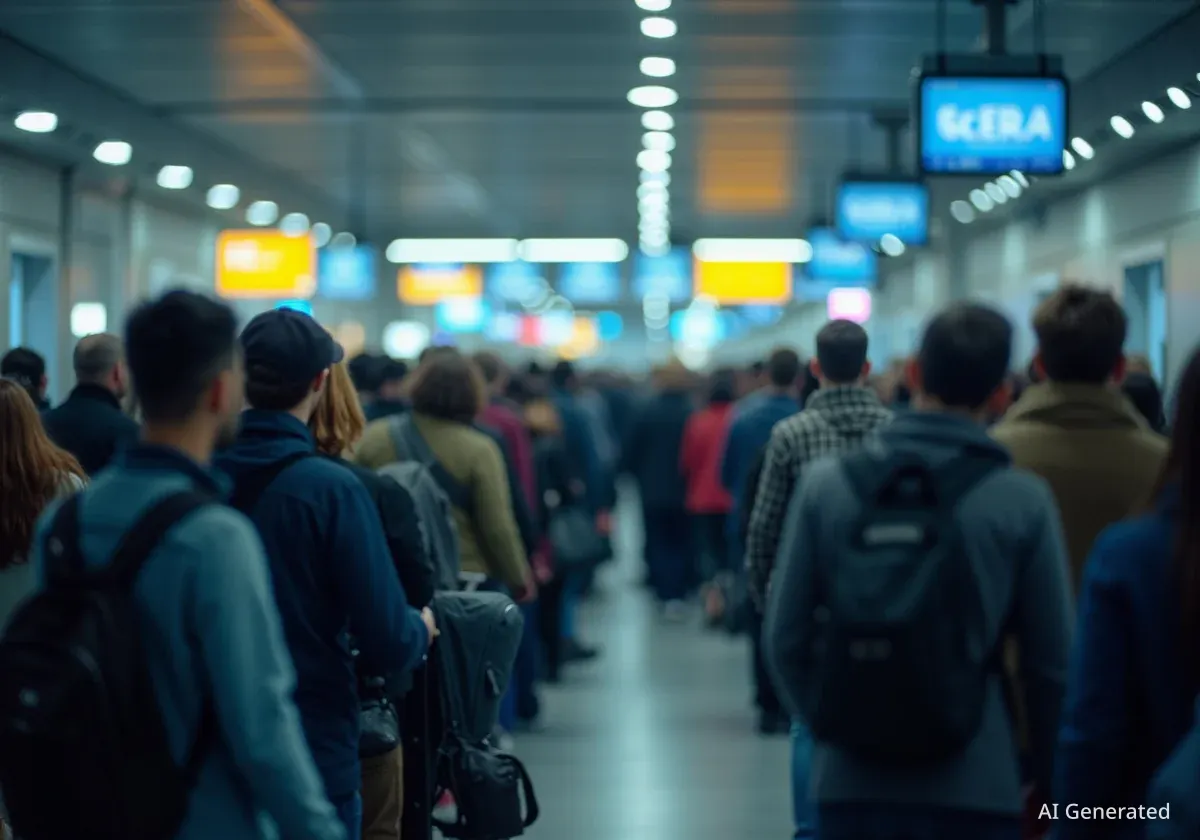Major European airports, including London Heathrow, Brussels, and Berlin, experienced significant travel disruptions this past weekend. The delays followed a "cyber-related incident" affecting technology provider Collins Aerospace, which supplies systems for airline check-in desks. This event led to airlines reverting to manual check-in processes, causing extended wait times for passengers.
Key Takeaways
- European airports faced widespread delays due to a cyber-related incident.
- Collins Aerospace, a key technology provider, was impacted.
- Airlines used manual check-in, leading to longer queues.
- Heathrow alone saw over 130 flights delayed and 13 cancellations.
- Travelers were advised to arrive significantly earlier for their flights.
Impact on Air Travel Across Europe
The cyber incident began on Friday, affecting critical airline systems. Collins Aerospace confirmed the issue, stating it was actively working to resolve the problem. The disruption forced airlines to switch from automated digital check-ins to older, manual methods. This change significantly slowed down passenger processing.
According to data from Flightradar24, the impact was immediate and substantial. By 11 AM on Sunday morning, London Heathrow Airport reported more than 130 flights delayed by 20 minutes or more. Additionally, 13 flights were canceled at Heathrow on Saturday alone. These numbers highlight the scale of the operational challenges.
"Work continues to resolve and recover from Friday’s outage of a Collins Aerospace airline system that impacted check-in. We apologise to those who have faced delays, but by working together with airlines, the vast majority of flights have continued to operate."
— Heathrow Airport social media statement
Important Fact
Collins Aerospace is a significant supplier of integrated systems and services for the aerospace and defense industries. Their technology is critical for many aspects of airport operations, including passenger processing.
Airline and Airport Responses to the Incident
Airports and airlines worked to manage the fallout. Heathrow Airport acknowledged the issues in a social media post. They apologized to affected travelers and emphasized ongoing efforts to restore full system functionality. The statement also noted that most flights were still able to operate despite the difficulties.
Other affected airports, including Brussels and Berlin, faced similar operational hurdles. These airports also advised passengers to plan for longer processing times. The shift to manual procedures required more staff involvement and extended the time needed for each passenger to check in and clear security.
Passenger Recommendations and Advisories
In response to the delays, airports issued specific guidance for travelers. Heathrow, along with other affected hubs, recommended that passengers arrive much earlier than usual. For long-haul international flights, the recommendation was to arrive at least three hours before departure. For short-haul flights, passengers were advised to arrive at least two hours beforehand.
These advisories aimed to mitigate further delays and reduce stress for travelers. Passengers were also encouraged to check their flight status before heading to the airport. This proactive step could help them stay informed about any changes or cancellations related to their travel plans.
Cybersecurity in Aviation
The aviation sector is a critical infrastructure target for cyberattacks due to its interconnected systems and reliance on technology. Incidents like this highlight the ongoing need for robust cybersecurity measures to protect airline operations and passenger data. Protecting these systems is essential for maintaining smooth global travel.
Understanding the Role of Collins Aerospace
Collins Aerospace provides a wide range of products and services to the aerospace industry. This includes avionics, interiors, aerostructures, and power and control systems. Crucially, they also supply critical information management systems for airports and airlines. These systems support functions like check-in, baggage handling, and flight management.
The specific system affected by the cyber incident was related to airline check-in desks. When such a core system is compromised, even temporarily, the ripple effect can be significant. It impacts not only the initial check-in process but also subsequent stages of travel, such as security and boarding.
Future Implications for Air Travel
This incident serves as a reminder of the vulnerabilities within modern travel infrastructure. As technology becomes more integrated into every aspect of air travel, the potential for cyber disruptions grows. Airlines and technology providers continually invest in cybersecurity to prevent such occurrences.
The event underscores the importance of having contingency plans for manual operations. While digital systems offer efficiency, the ability to revert to manual processes, even if slower, is crucial for maintaining continuity during unforeseen outages. This balance between automation and resilience is a key challenge for the industry.
- Impacted Airports: Heathrow, Brussels, Berlin
- System Affected: Collins Aerospace airline check-in technology
- Operational Change: Reversion to manual check-in processes
- Heathrow Delays: Over 130 flights delayed by 20+ minutes
- Heathrow Cancellations: 13 flights on Saturday
- Passenger Advice: Arrive 2-3 hours early
The situation at these European airports highlights the growing concern over cybersecurity risks in global transportation. As investigations continue, the focus remains on fully restoring services and reinforcing defenses against future incidents.





